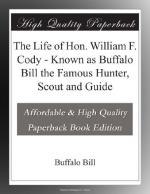At Westchester, Pennsylvania, I had some relatives living whom I had never seen, and now being so near, I determined to make them a visit. Upon mentioning the matter to Buntline, he suggested that we should together take a trip to Philadelphia, and thence run out to Westchester. Accordingly the next day found us in the “City of Brotherly Love,” and in a few hours we arrived at the home of my uncle, General Henry R. Guss, the proprietor of the Green Tree Hotel, who gave us a cordial reception.
Inviting us into the parlor, my uncle brought in the members of his family, among them an elderly lady, who was my grandmother, as he informed me. He told me that my Aunt Eliza, his first wife, was dead, and that he had married a second time; Lizzie Guss, my cousin, I thought was the most beautiful girl I had ever seen. They were all very anxious to have us remain several days, but as I had some business to attend to in New York, I was obliged to return that day. Assuring them, however, that I would visit them again soon, I bade them adieu, and with Buntline took the train for New York.
The time soon arrived for my departure for the West; so packing up my traps I started for home, and on the way thither I spent a day with my Westchester relatives, who did everything in their power to entertain me during my brief stay with them.
CHAPTER XXVII.
HONORS.
Upon reaching Fort McPherson, I found that the Third Cavalry, commanded by General Reynolds, had arrived from Arizona, in which Territory they had been on duty for some time, and where they had acquired quite a reputation on account of their Indian fighting qualities.
Shortly after my return, a small party of Indians made a dash on McPherson Station, about five miles from the fort, killing two or three men and running off quite a large number of horses. Captain Meinhold and Lieutenant Lawson with their company were ordered out to pursue and punish the Indians if possible. I was the guide of the expedition and had as an assistant T.B. Omohundro, better known as “Texas Jack” and who was a scout at the post.
Finding the trail, I followed it for two days, although it was difficult trailing because the red-skins had taken every possible precaution to conceal their tracks. On the second day Captain Meinhold went into camp on the South Fork of the Loupe, at a point where the trail was badly scattered. Six men were detailed to accompany me on a scout in search of the camp of the fugitives. We had gone but a short distance when we discovered Indians camped, not more than a mile away, with horses grazing near by. They were only a small party, and I determined to charge upon them with my six men, rather than return to the command, because I feared they would see us as we went back and then they would get away from us entirely. I asked the men if they were willing to attempt it, and they replied that they would follow me wherever I would lead them. That was the kind of spirit that pleased me, and we immediately moved forward on the enemy, getting as close to them as possible without being seen.




